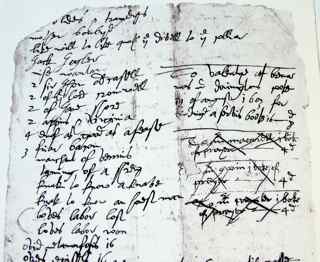Love's Labour's Won
Historical Records
1598, Palladis Tamia:
In 1598 Francis Meres, a cleric and schoolmaster, published a lengthy essay entitled Palladis Tamia, or Wits Treasury, in which he praised contemporary English poets by comparing them favorably to their classical counterparts. He wrote the following paragraph about Shakespeare:
As Plautus and Seneca are accounted the best for comedy and Tragedy among the Latines: so Shakespeare among ye English is the most excellent in both kinds for the stage; for Comedy, witnes his Ge[n]tleme[n] of Verona, his Errors, his Loue labors lost, his Loue labours wonne, his Midsummers night dreame, & his Merchant of Venice: for Tragedy his Richard the 2. Richard the 3. Henry the 4. King Iohn, Titus Andronicus and his Romeo and Iuliet.
1603, Packing slip, Christopher Hunt:
A bookseller named Christopher Hunt moved to Exeter in 1603 when he finished his apprenticeship in London. He had books shipped to him at his new location. A leaf of manuscript—apparently a packing slip—dated 19 August 1603 on the verso (9 August on the recto) was discovered in 1953 by a London bookseller and antiquarian named Pottesman as part of the binding of a collection of sermons printed in 1637 (Certaine Sermons). Pottesman showed the leaf of manuscript to American scholar T. W. Baldwin as he was leaving the British Museum (now Library) on the evening of 31 December 1953. Baldwin subsequently researched the provenance of the manuscript and determined that it represented property of Christopher Hunt. Baldwin published his findings in Shakspere's Love's Labor's Won in 1957.
Upper half of the Hunt packing slip:
Theatrical Provenance
<Enter information about which company performed the play, and where/when it was performed, etc.>
Probable Genre(s)
<List possible genres of the play: if noted by a critic, cite them, e.g. "Comedy (Harbage)". If an original speculation, simply list the genre.>
Possible Narrative and Dramatic Sources or Analogues
<Enter any information about possible or known sources. Summarise these sources where practical/possible, or provide an excerpt from another scholar's discussion of the subject if available.>
References to the Play
<List any known or conjectured references to the lost play here.>
Critical Commentary
<Summarise any critical commentary that may have been published by scholars. Please maintain an objective tone!>
For What It's Worth
<Enter any miscellaneous points that may be relevant, but don't fit into the above categories. This is the best place for highly conjectural thoughts.>
Works Cited
<List all texts cited throughout the entry, except those staple texts whose full bibliographical details have been provided in the masterlist of Works Cited found on the sidebar menu.>
<If you haven't done so already, also add here any key words that will help categorise this play. Use the following format, repeating as necessary:>
Site created and maintained by your name, affiliation; updated DD Month YYYY.
